Contents
In 2017 alone, victims lost US$ 19,061,703 to romance and dating scammers. New tech helps you protect your users, but it also gives scammers new opportunities to deceive them.
We sat down with Steve Baker, former director at FTC, and Patrik Frisk, Besedo CEO, to discuss the future of romance scams and how artificial intelligence can help you prepare.
Steve Baker: I will start by sharing some rather terrifying stats:
- At any one time, there may be 25,000 romance scammers online; most of them located in Lagos.
- More than 14% of all profiles created are fraudulent.
- US/Canadian victims reporting have lost nearly a billion US$ over the last three years.
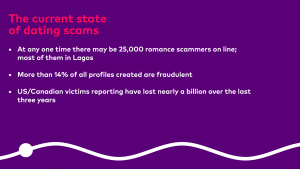
What can dating sites do to help prevent romance scams?
Steve Baker: With so many potential victims it’s important that companies take responsibility for the safety of their users, and learn how to spot scammers and how to prevent them from reaching end users.
Companies need to:
- Provide better warnings, especially to people contacted by fake profiles.
- Screen profiles thoroughly.
- Moderate 1-to-1 messages.

Patrik Frisk: This is exactly what our clients are doing. They realize that it’s not only bad for the bottom line when users get scammed, they also feel responsible for keeping their users safe. We help them understand what dating scams look like, how to deal with new trends and we are vigilant in updating our clients when scammers change tactics.
The framework for the dating scams we encounter daily is actually quite basic:
- Grab attention.
- Build a relationship with the victim.
- Move the communication off-site as quickly as possible.
- Continue building the relationship until the victim is deemed ready for monetary requests.
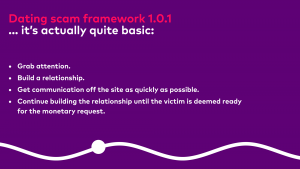
When we talk about scams and how to detect it we often refer to what we call scam markers. Scam markers are specific elements within a text, picture or the surrounding data that indicates that there’s a chance this could be a scam.
When it comes to romance scams these are some of the most common scam markers we encounter:
- Specific phrases and words, such as “I am a God fearing man/woman”.
- Location.
- Number of submissions.
- Broad age range interest (18-99 y/o).
- Picture selection (stock photo, stolen).
- Occupation (businessman in Africa, military out-stationed in Africa, missionary in Africa).
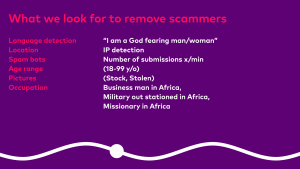
To prevent scams we help our clients through a number of different solutions:
- Custom AI models that are trained on labeled data and learns which content is unwanted.
- Automatic filters which can check for IP addresses, specific phrases etc. In our tool Implio, we are capable of setting up complex rules that can catch the majority of scam markers.
- Human moderation by agents trained specifically to detect romance scammers.

How are users affected by romance scams?
Steve Baker: The emotional damage is often at least as bad as the money loss. In fact, Australian law enforcement believes that Australia has more deaths from suicides over romance fraud than they do from murders.
Patrik Frisk: We have handled customer support for big dating sites and we have seen the heart-wrenching complaints from the few people who report getting scammed. There’s no denying that these people have been severely hurt and that their trust in the site they were scammed on has been severely shaken if not completely broken.
Steve Baker: Yes, it can be quite a traumatic experience, and it’s not only women that are touched by this as many believe. The number of male victims matches that of females, they are just far less likely to complain. Romance fraud also targets the LGBT community and it’s a global issue with scammers operating out of centers in, for example, Africa, Russia or the Ukraine.
What does the future of romance scams look like? Are we about to get them under control?
Steve Baker: I am afraid not.
Unfortunately, while we have companies like Besedo working hard on creating solutions and technology to help prevent fraud, scammers are also working overtime to develop new ways to con victims. In the future, we will see crooks using new technology to target users and circumvent out-of-date moderation processes.

We will also see scammers picking up video as a channel to communicate with and use as a method for sextortion. This will most likely lead to an increase of organized sextortion gangs.
Sextortion is when scammers lure victims to either get naked or perform sexual acts on a video call and record the act to threaten later to distribute it unless paid.

Patrik Frisk: I can only agree with this prediction, unfortunately.
We are seeing a lot of sites starting to add video chat to their site, which is a great way to make “first dates” safer for the users and also a great way for higher user engagement and revenue. Unfortunately, it also gives scammers another channel to utilize for sextortion, that Steve Baker mentioned. According to cyberbullying.org, 40% of sextortion victims met the perpetrator online. If we don’t put great processes in place for video moderation, we expect that number to grow as video becomes more common on dating sites.

Steve Baker: I also foresee that crooks increasingly will watch what law enforcement does and learn from that to better avoid capture.
Patrik Frisk: That prediction holds true for content moderation processes as well. We know that scammers are learning from getting their fake profiles rejected and continuously invent new ways to slip through the moderation net. It’s one of our internal research teams most challenging and important jobs to keep up with new scam trends so we can ensure that scammers are caught as quickly as possible.

Steve Baker: One of those new methods is to use social media, both as a platform to scam, but also to support the credibility of fake profiles the scammers create on online dating sites. Many people will do a quick cursory check of the social media profile of a potential love interest, both to learn more about them, but also to verify that the person is real. Scammers have learned this and will increasingly create a fake online personality that stretches over multiple platforms rather than just a fake profile on a singular site.
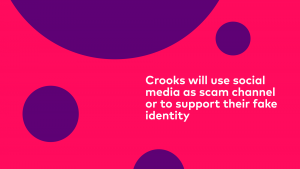
Finally, I predict dating companies are going to get more scrutiny for their practices. Cases against Western Union and MoneyGram show that companies that don’t take basic precautions to protect their customers are at risk.
Patrik Frisk: Government legislation and increased responsibility being put on marketplaces is definitely something we are likely to see in the future. One new trend scam, that may get harder to combat because of this is a shift in where the scam takes place. Scammers have gotten a lot better at creating genuine looking profiles, which moves the scam detection to 1-to-1 messages.
One of the main challenges with moderating 1-to-1 messages is, of course, user privacy. How much will people approve of us looking into their private conversations?
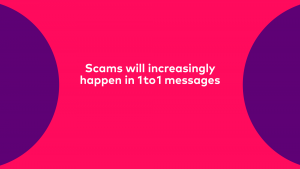
In Europe, we’re seeing a lot of initiatives towards protecting user data, GDPR that goes live in May for instance. This, unfortunately as mentioned, may make it harder to keep users safe from scammers in the digital world. GDPR is most likely only a first step as we step into an age where user privacy will be a huge discussion point.

The solution is to let AI handle the sensitive task of keeping users safe while also respecting their privacy and government legislation. AI moderation is moving from a tool to cut costs into a necessity for legal compliance. This is one of the reasons to why we are working hard on implementing free AI modules in our moderation tool. To make it available for smaller sites who, due to volumes required for tailored models, otherwise would not have access to AI moderation.
As far as long term trends go, we will probably see VR becoming a stable element on dating sites, similar to what we’re experiencing with video right now. When that time arrives, scammers will most likely latch on to this new communication channel and abuse it for fraud, but when this happens we will be ready with a solution to keep them at bay and keep your users safe.
Related articles
See allSee all articlesThis is Besedo
Global, full-service leader in content moderation
We provide automated and manual moderation for online marketplaces, online dating, sharing economy, gaming, communities and social media.





